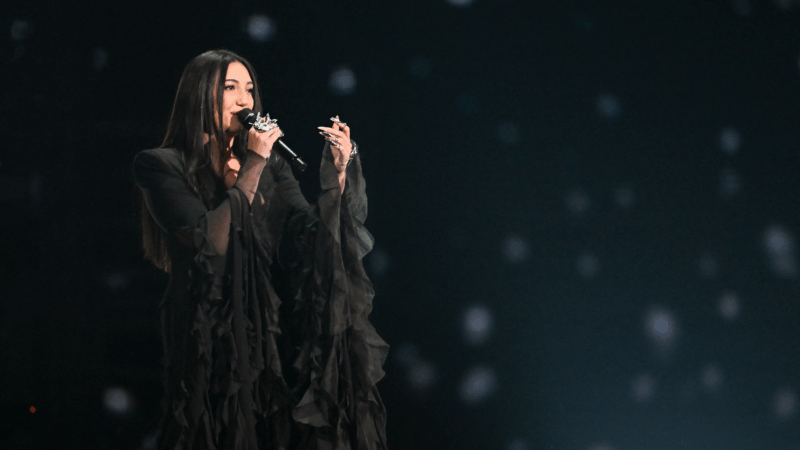Yuval Raphael, a Hamas attack survivor, is representing Israel at Eurovision
TEL AVIV, Israel — This week the Eurovision Song Contest is underway in Basel, Switzerland. The world’s largest song competition includes contestants representing 37 countries — including Israel, whose presence is sparking protest because of the war in Gaza.
Israel’s representative in the competition, 24-year-old Yuval Raphael, is set to perform a pop ballad titled “New Day Will Rise,” a song that reflects coping and hope after loss and tragedy, with lyrics including “Life will go on, everyone cries, don’t cry alone.”
Raphael has a direct personal connection to the song, as she is a survivor of the Oct. 7, 2023, Hamas-led attack on Israel. On that morning, Raphael was dancing with friends at the Nova music festival, not far from Israel’s border with Gaza — which was infiltrated by armed Hamas militants, who killed 378 civilians at the party grounds. Raphael and her friends fled to a small shelter near the dance floor, but Hamas fighters found the shelter, entered, and repeatedly fired at those hiding inside.
Raphael survived by playing dead under the bodies of others. Rescuers only came after several hours, during which time many of the young people with her inside the shelter were killed.
“Only I and 10 others were saved from our 4 square meter shelter,” she later told the United Nations Human Rights Council, “a shelter that had become the tomb for almost 40 souls seeking refuge with us. The physical injuries I sustained are healing, but the mental scars will stay with me forever.”
Now, a year and seven months later, Raphael is preparing to take the Eurovision stage, having qualified this week for Saturday’s grand final. But there’s widespread opposition to Israel’s participation in the contest. Broadcasters from Ireland, Spain, Slovenia and Belgium approached the European Broadcasting Union, the organization responsible for producing Eurovision, and demanded a discussion earlier this month about Israel’s inclusion.
Ireland’s public broadcaster RTÉ announced it received an explicit commitment from the EBU for a “wider discussion amongst members in due course.” This is the first time the EBU has indicated it is open to discussing the possible removal of Israel from the competition.
Eurovision organizers were aware of the tension surrounding Israel’s participation this year and made some changes to the rules. Until last year, the contest prohibited the display of flags from countries not participating in the competition. This led to protests over the inability to wave Palestinian flags. Now audience members are allowed to wave any flag that does not violate Swiss law.
However, the EBU clarified that no political expression of any kind will be permitted onstage. This aims to prevent situations like last year’s, when a Portuguese singer performed with nails painted with keffiyeh designs.
Yoav Tzafir, the Israeli delegation’s director, has prepared Raphael for the possibility that the audience will boo her during her performance on Saturday. This happened last year, when Eden Golan represented Israel at Eurovision with the song “Hurricane.” Golan was booed heavily during her performance, but still placed fifth. She was protected by Israeli intelligence agents and wore a blonde wig as a disguise during the week of the contest.
Tzafir tells NPR he prepared a recording of booing sounds for Raphael, which she played in her car while practicing her performance. “So she is practicing for two months,” says Tzafir. “I’m not joking, to sing with booing, because if she practices it, it won’t bother her.”
Last Sunday, he says, “We had an incident near the red carpet. Of course there were demonstrations and [Palestinian] flags, which is okay, but one of the protesters made a throat-slitting movement towards our guys — and that’s not okay, of course. We complained to the police, and they are looking for this guy. So when we see the flags, it’s okay, but when we see these movements of cutting our throats, maybe we understand the meaning of the demonstration. They aren’t freedom fighters who demonstrate; they just want us to be dead.”
William Lee Adams, founder of a popular Eurovision blog, says despite the tensions over the Gaza war, he believes the atmosphere this year is calmer than last year.
“Switzerland is famously neutral,” he says, “and on the ground, you do find that people are very willing to discuss political situations, but in a civil manner. My hope is that [Raphael] is not booed — because not only is that uncomfortable for her, but for the other contestants as well who come before her and after her.”
Since Israel began competing in Eurovision in 1973, it has won four times and ranks seventh in wins overall. Despite the backlash and controversy around its participation this year, Raphael is currently ranked sixth in the betting odds. Her final placement will be known only after the grand final on Saturday night, when she will compete against 24 performers from other countries, all vying to host the contest next year.
NPR’s Daniel Estrin contributed to this report from Tel Aviv.
Video of Clinton depositions in Epstein investigation released by House Republicans
Over hours of testimony, the Clintons both denied knowledge of Epstein's crimes prior to his pleading guilty in 2008 to state charges in Florida for soliciting prostitution from an underage girl.
Some Middle East flights resume, but thousands of travelers are still stranded by war
Limited flights out of the Middle East resumed on Monday. But hundreds of thousands of travelers are still stranded in the region after attacks on Iran by the U.S. and Israel.
‘Hamnet’ star Jessie Buckley looks for the ‘shadowy bits’ of her characters
Buckley has been nominated for a best actress Oscar for her portrayal of William Shakespeare's wife in Hamnet. The film "brought me into this next chapter of my life as a mother," Buckley says.
How, who, and why: NPR flips its famous letters to defend the right to be curious
NPR is standing up for the public's right to ask hard questions in a national campaign dubbed "For your right to be curious." At NPR's headquarters, on billboards in New York City, Chicago, and Washington, D.C., and across social media, NPR's three iconic letters transform into "how," "who," and "why" — a bold declaration of its commitment to fight for Americans' right to ask questions both big and small.
Oil prices surge, but no panic yet, as Iran war continues
Global oil prices are in the high $70s as traffic through Strait of Hormuz comes to a halt. Some analysts have warned they could top $100 a barrel if the stoppage is prolonged.
Hegseth: ‘We didn’t start this war but under President Trump we’re finishing it’
The remarks are the first to reporters since the U.S.-Israeli military operations against Iran began Saturday despite weeks of talks designed to stave off a conflict.








